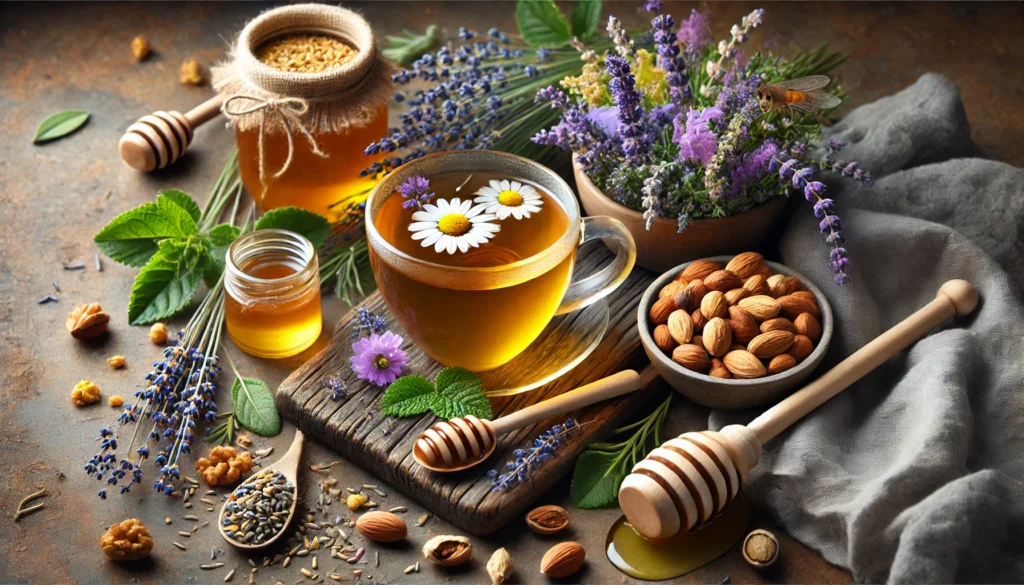Anxiety is a complex emotional state characterized by feelings of tension, worried thoughts, and physical changes like increased blood pressure. While therapy and medication are traditional approaches to managing anxiety, nutrition plays an often-overlooked role in maintaining mental health. Certain vitamins and minerals have been shown to alleviate symptoms of anxiety and stress, acting as natural supplements for stress relief.
You may also like: Essential Oils for Emotional Well-Being
The Complexity of Anxiety
Anxiety manifests in multiple forms, ranging from generalized anxiety disorder to panic attacks, and can significantly impact daily life. Each form of anxiety presents different symptoms, such as irritability, restlessness, and difficulty concentrating, and requires tailored management strategies. Understanding these variations is crucial in identifying the right nutritional interventions and supplements that can provide relief.
Nutrition’s Role in Mental Health
The connection between diet and mental health is gaining recognition in scientific circles. Nutrients can influence brain function and emotional regulation, highlighting the importance of a balanced diet. Certain deficiencies, like those in vitamin D or zinc, have been linked to mood disturbances. As such, nutrition becomes a foundational aspect of mental health, underscoring the importance of nutritional therapy.
Integrating Nutrition with Traditional Treatments
While therapy and medications are valuable, integrating nutritional strategies can enhance overall treatment efficacy. Nutritional therapy can complement traditional methods, offering a holistic approach to anxiety management. By combining these approaches, individuals may experience improved outcomes and greater overall well-being.
The Historical Context of Nutritional Therapy
The use of food and natural supplements to promote mental well-being isn’t a novel concept. Traditional medicine systems, such as Ayurveda and Traditional Chinese Medicine, have long recognized the connection between diet and mental health. These ancient practices often employed herbs and food-based treatments to balance the body’s energy and relieve stress.
Traditional Medicine Practices
Ayurveda and Traditional Chinese Medicine have utilized nutrition as a tool for maintaining mental balance for centuries. Ayurveda emphasizes the role of doshas and diet in achieving equilibrium, while Traditional Chinese Medicine focuses on balancing yin and yang through dietary choices. These practices underscore the belief that diet is integral to emotional health and stress management.
Historical Use of Herbs
Throughout history, various cultures have relied on herbs to treat anxiety and stress. Herbs like valerian root, passionflower, and chamomile have been used for their calming properties. Documented in ancient texts, these herbs were often brewed into teas or tinctures, highlighting the long-standing tradition of using nature’s bounty for mental health.
Evolution of Nutritional Science
With the advancement of nutritional science, the understanding of how specific nutrients affect mental health has evolved. Early scientific inquiries laid the groundwork for recognizing the role of vitamins and minerals in brain function. As research continues, historical practices are being validated, leading to a resurgence in their use in modern anxiety management.

Key Vitamins and Supplements for Anxiety Relief
Vitamin B Complex: The Stress Busters
Vitamin B complex, including B1 (thiamine), B2 (riboflavin), B3 (niacin), B5 (pantothenic acid), B6 (pyridoxine), B7 (biotin), B9 (folate), and B12 (cobalamin), plays a crucial role in brain health. These vitamins help produce neurotransmitters like serotonin and dopamine, which regulate mood and anxiety. Research suggests that deficiencies in B vitamins can lead to increased anxiety and depression. Therefore, incorporating foods rich in B vitamins or taking a B complex supplement can be beneficial.
The Role of Each B Vitamin
Each B vitamin contributes uniquely to mental health. For instance, B1 aids in converting nutrients into energy, supporting cognitive function. B6 is pivotal in neurotransmitter synthesis, while B12 maintains nerve health. Understanding these roles helps in identifying which B vitamin may be most beneficial for specific anxiety symptoms.
Food Sources of B Vitamins
Rich dietary sources of B vitamins include whole grains, legumes, eggs, and leafy greens. Incorporating a variety of these foods ensures adequate intake of these essential nutrients. For those with dietary restrictions, fortified cereals and plant-based alternatives can help meet nutritional needs.
Supplementation Considerations
For individuals unable to meet their B vitamin requirements through diet alone, supplementation is a viable option. High-quality B complex supplements can bridge nutritional gaps, but it’s important to choose reputable brands. Consulting with a healthcare provider can help determine the appropriate dosage and prevent potential interactions with medications.
Magnesium: The Calming Mineral
Magnesium is often referred to as the “relaxation mineral” due to its calming effects on the nervous system. This mineral helps regulate neurotransmitters and can reduce stress and anxiety levels. Studies have shown that magnesium deficiency is linked to increased anxiety and stress. Foods rich in magnesium include leafy greens, nuts, seeds, and whole grains. Alternatively, magnesium supplements are available for those who struggle to get enough from their diet.
Mechanisms of Magnesium
Magnesium supports the regulation of neurotransmitters and the reduction of cortisol, the stress hormone. It also promotes muscle relaxation and can improve sleep quality, indirectly reducing anxiety. These mechanisms illustrate why magnesium is considered essential for stress management.
Dietary Sources of Magnesium
Leafy greens like spinach, nuts such as almonds, and seeds like pumpkin seeds are excellent sources of magnesium. Incorporating these foods into meals can naturally boost magnesium levels. Cooking methods also matter; steaming vegetables can help retain their magnesium content.
Supplement Options and Usage
Magnesium supplements come in various forms, such as magnesium citrate and magnesium oxide. Each form has different absorption rates and effects, making it important to select the right type for individual needs. Consulting with a healthcare professional can guide dosage decisions and ensure safe use.
Omega-3 Fatty Acids: Brain Health Boosters
Omega-3 fatty acids, found abundantly in fish oil, are essential for brain health. They are known to reduce inflammation and promote healthy neurotransmitter function. Research indicates that omega-3 supplementation can alleviate symptoms of anxiety and depression, making them one of the best supplements for stress and anxiety. For those who don’t consume fish regularly, omega-3 supplements are a viable option.
Importance of Omega-3s
Omega-3s play a critical role in maintaining brain structure and function. They are involved in the production of neurotransmitters and can reduce neuroinflammation. These functions are vital for maintaining mental health and reducing anxiety.
Sources and Intake
Fatty fish like salmon, mackerel, and sardines are rich in omega-3 fatty acids. For vegetarians, flaxseeds and chia seeds offer plant-based options. Regular consumption of these foods can ensure adequate omega-3 intake, although supplements can provide a concentrated source.
Choosing Omega-3 Supplements
When selecting omega-3 supplements, consider the concentration of EPA and DHA, the active components. Fish oil and algae-based supplements offer different benefits, with algae being a vegetarian-friendly option. Ensuring purity and sustainability is also key when choosing a supplement brand.
Ashwagandha: The Adaptogenic Herb
Ashwagandha is an adaptogenic herb used in Ayurvedic medicine for centuries. It is renowned for its ability to help the body adapt to stress and reduce anxiety. Scientific studies have validated its efficacy as a natural supplement for stress relief. Ashwagandha supplements can be found in various forms, including capsules, powders, and teas.
Adaptogenic Properties
Ashwagandha helps balance stress hormones and improves the body’s resilience to stress. It modulates the hypothalamic-pituitary-adrenal (HPA) axis, which plays a significant role in stress response. This adaptogenic property makes it a popular choice for managing anxiety and enhancing overall well-being.
Traditional and Modern Uses
Traditionally, ashwagandha was used to boost energy and promote longevity. Today, it is widely used to combat stress, improve sleep, and enhance cognitive function. Its versatility and historical significance contribute to its enduring popularity as a natural remedy.
Forms and Dosage
Ashwagandha is available in various forms, each offering distinct benefits. Capsules provide a convenient option, while powders can be added to smoothies. When considering dosage, it’s essential to follow guidelines and consult with a healthcare provider to avoid potential side effects.
L-Theanine: The Relaxation Amino Acid
L-theanine, an amino acid found in tea leaves, particularly green tea, promotes relaxation without causing drowsiness. It increases the production of calming neurotransmitters and reduces the stress response. As a result, L-theanine is often included in anti-stress supplements and beverages aimed at promoting relaxation.
Mechanisms of Action
L-theanine enhances alpha brain wave activity, promoting a state of relaxed alertness. It also increases levels of serotonin, dopamine, and GABA, neurotransmitters that regulate mood and stress. These mechanisms contribute to its calming effects without sedation.
Natural Sources of L-Theanine
Green tea is the primary source of L-theanine, offering a natural way to incorporate this amino acid into your diet. Drinking green tea regularly can provide a steady supply of L-theanine, along with other health benefits from antioxidants.
Supplementation and Effects
L-theanine supplements offer a concentrated dose for those seeking enhanced relaxation effects. They can be combined with other supplements like magnesium for synergistic benefits. As with any supplement, it’s important to consider potential interactions and consult with a healthcare provider.

The Science Behind Anxiety-Reducing Nutrients
The relationship between diet, supplements, and mental health is a burgeoning field of scientific inquiry. Researchers are exploring how specific nutrients can influence brain chemistry and, by extension, mood and anxiety levels. While individual responses to supplements can vary, the growing body of evidence supports the potential benefits of these nutrients in managing anxiety.
Nutrients and Neurotransmitters
Nutrients play a critical role in neurotransmitter synthesis and function. For instance, amino acids are precursors to neurotransmitters like serotonin, while vitamins and minerals act as cofactors in their production. This intricate relationship underscores the importance of a nutrient-rich diet for mental health.
Current Research and Findings
Recent studies have highlighted the efficacy of various nutrients in reducing anxiety symptoms. For example, omega-3 fatty acids have been shown to lower inflammation and improve mood disorders. Such findings validate the use of nutrition as a complementary approach to traditional anxiety treatments.
Personalized Nutrition Approaches
Advancements in genetic testing and biomarker analysis are paving the way for personalized nutrition strategies. By understanding an individual’s unique biochemical makeup, tailored recommendations can optimize nutrient intake and enhance mental health outcomes. This personalized approach holds promise for more effective anxiety management.
Current Trends and Future Implications
In recent years, there has been a surge in interest in natural and holistic approaches to health and wellness. This trend is reflected in the increasing popularity of dietary supplements for anxiety and stress relief. As consumers become more informed about the potential side effects of pharmaceutical interventions, the demand for safe and effective natural alternatives is likely to rise.
The Shift Towards Holistic Health
The growing preference for holistic health approaches reflects a broader shift towards wellness that encompasses mind, body, and spirit. Consumers are increasingly seeking natural solutions that offer fewer side effects and align with sustainable practices. This shift is driving innovation in the supplement industry and expanding the market for anxiety-reducing nutrients.
The Role of Technology in Mental Health
Technology is playing a transformative role in mental health management. From apps that track nutrient intake to wearable devices that monitor stress levels, technology is making personalized health more accessible. These tools can help individuals make informed choices about their diet and supplement use, potentially improving mental health outcomes.
Future Directions in Anxiety Management
The future of anxiety management may see a greater emphasis on personalized nutrition and supplementation. Advances in genetic testing and biomarker analysis could allow for tailored recommendations based on an individual’s unique biochemical makeup. This personalized approach holds the promise of optimizing the effectiveness of nutritional interventions for mental health.

Practical Advice for Incorporating Anxiety-Reducing Nutrients
For those seeking to incorporate these essential nutrients into their daily routine, a balanced approach is key. Here are some practical tips:
- Diverse Diet: Aim to consume a varied diet rich in whole foods, including fruits, vegetables, nuts, seeds, lean proteins, and whole grains. This ensures a broad spectrum of essential nutrients.
- Consider Supplements: If dietary intake is insufficient, supplements can fill the gaps. Choose high-quality supplements from reputable brands to ensure purity and potency.
- Consult a Professional: Before starting any new supplement regimen, it’s wise to consult with a healthcare provider, particularly if you have underlying health conditions or are taking medications.
- Monitor and Adjust: Pay attention to how your body responds to dietary changes and supplements. Adjust as necessary to find what works best for you.
Balancing Diet and Supplements
Finding the right balance between diet and supplementation is crucial for optimal health. While whole foods should be the primary source of nutrients, supplements can provide additional support when needed. Monitoring dietary patterns and nutrient intake can help identify areas for improvement.
Evaluating Supplement Quality
Not all supplements are created equal, making it important to evaluate quality and efficacy. Look for third-party testing, certifications, and transparent labeling. These indicators can help ensure that supplements meet safety and potency standards.
Building a Sustainable Routine
Incorporating anxiety-reducing nutrients into daily life requires consistency and sustainability. Setting realistic goals and making gradual changes can promote long-term adherence. Regularly reassessing dietary habits and supplement use can help maintain progress and adapt to changing needs.
In conclusion, while anxiety is a multifaceted condition, the strategic use of vitamins and supplements can be a valuable tool in managing stress and promoting mental well-being. By understanding the science behind these nutrients and their historical significance, we can make informed choices that support a healthier, more balanced life.
Remember, it’s always important to approach any health regimen with a balanced perspective and a commitment to ongoing learning and adaptation.
Further Reading:
Supplements For Stress That Actually Work, According to Experts
Herbal treatment for anxiety: Is it effective?
Best Supplements to Take When Stressed
Important Note: The information contained in this article is for general informational purposes only, and should not be construed as health or medical advice, nor is it intended to diagnose, prevent, treat, or cure any disease or health condition. Before embarking on any diet, fitness regimen, or program of nutritional supplementation, it is advisable to consult your healthcare professional in order to determine its safety and probable efficacy in terms of your individual state of health.
Regarding Nutritional Supplements Or Other Non-Prescription Health Products: If any nutritional supplements or other non-prescription health products are mentioned in the foregoing article, any claims or statements made about them have not been evaluated by the U.S. Food and Drug Administration, and such nutritional supplements or other health products are not intended to diagnose, treat, cure, or prevent any disease.


